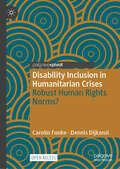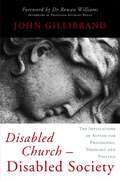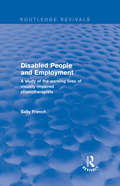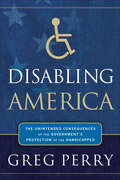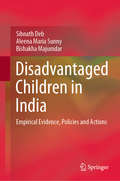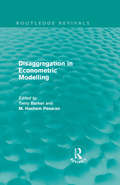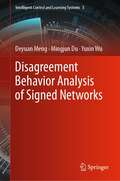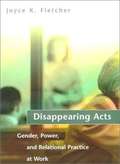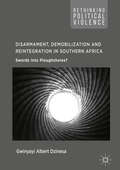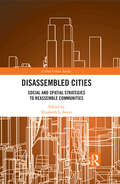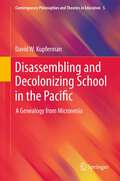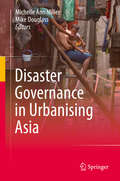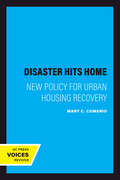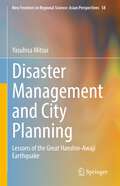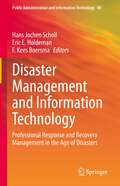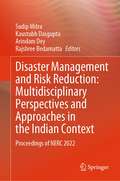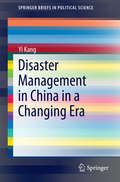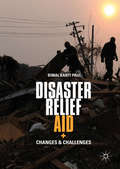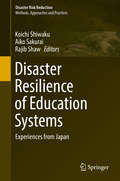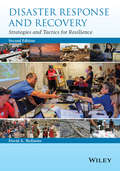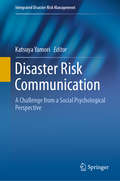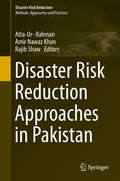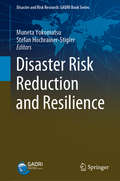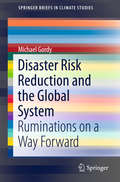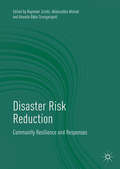- Table View
- List View
Disability Inclusion in Humanitarian Crises: Robust Human Rights Norms? (Palgrave Studies in Disability and International Development)
by Dennis Dijkzeul Carolin FunkeThis open access book studies disability inclusion in humanitarian crises. It addresses the challenges of recognizing and including persons with disabilities and indicates the degree to which disability is being mainstreamed in international law and humanitarian action. Further, it explores how international organizations have promoted a rights-based understanding of disability in international law, and to what extent this understanding has gained acceptance in humanitarian policy and practice. Theoretically, Funke and Dijkzeul explore the robustness of the disability inclusion norm cluster during processes of institutionalization, translation, and implementation. The book examines these processes from a multi-level perspective, which involves a variety of actors beyond states, including organizations of persons with disabilities. Situating their analysis within the literature on humanitarian action and development, the authors argue for an increased focus on processes “below” the international level in international relations and international law scholarship to better understand disability inclusion.
Disabled Church - Disabled Society
by John GillibrandIn this moving and intelligent book John Gillibrand, an Anglican priest, draws on his experience of caring for his non-verbal son, Adam, who has autism and is now a teenager. He reflects on how the experience has changed not just his life, but also his whole way of thinking about theology, politics and philosophy. Illuminated by an account of his day to day experiences with Adam, and deeper reflection upon the meaning of that experience, John Gillibrand considers the challenges that autism - and disability in general - present to the western tradition of thought in theology and philosophy. His experiences lead him to consider the place of people with autism in relation to religion and philosophy, and how the difficulties in providing adequate public services for those with autism and their carers point to a need for radical transformation of western political structures. This thoughtful and incisive book will be of interest to theologians, philosophers and sociologists, as well as to all those trying to integrate people with autism into society. Parents and carers will find much to reflect on. Shortlisted for the Michael Ramsey Prize for theological writing 2013.
Disabled People and Employment: A Study of the Working Lives of Visually Impaired Physiotherapists (Routledge Revivals Ser.)
by Sally FrenchThis title was first published in 2001. Providing a detailed account of the working lives of visually impaired physiotherapists in Britain, this study also presents an overview of the employment position of disabled people in the UK, and is underpinned by a social model which views disability in terms of societal barriers rather than in terms of impairment.
Disabling America: The Unintended Consequences of the Government's Protection of the Handicapped
by Greg Perry“Presents competent arguments along with shocking, interesting, and inspiring stories . . . a solid case against the ADA—and a great read at that.” —The Objective StandardDespite what many politicians would like you to believe, the Americans with Disabilities Act is a travesty of government regulation—it actually harms businesses, taxpayers, and, ironically, the people it’s supposed to help: disabled Americans. In fact, it is such a disaster that Greg Perry, a man who himself was born disabled, declares in this eye-opening book, “I am so very grateful that I was born long before the ADA was put into law.”Feisty and frank, Perry exposes the dangerous consequences of this supposedly compassionate law and shows through personal accounts and sobering statistics that quality of public life for the disabled hasn’t been improved since the ADA was signed into law; instead, the liberties of all Americans have been diminished considerably. Citing alarming, outrageous examples of frivolous lawsuits, unnecessary reliance on government intervention, reams of bureaucratic red tape, and stifled economic growth for all, Perry boldly contends that the Americans with Disabilities Act has fostered a culture of dependence, dangerously convincing many people that they can’t make it without the government’s help.Told with the passion and conviction of a man who has seen firsthand the many ways such intrusive government threatens our freedom, this book finally exposes how the ADA is a legislative disaster that, in effect, disables all Americans.
Disadvantaged Children in India: Empirical Evidence, Policies and Actions
by Sibnath Deb Aleena Maria Sunny Bishakha MajumdarThis book addresses issues concerning five major categories of disadvantaged children, namely street children, children involved in trafficking, child labor, slum children, and children in institutional care, which apply to a large number of children around the world, including India. Compiling primary and secondary research-based evidences in addition to the first-hand experiences of the authors, it describes the link between social dynamics and the plight of disadvantaged children from both social and cultural perspectives. Each chapter includes examples and case studies to offer readers essential insights into the real-life situations of these children. At the end of each chapter, a number of evidence-based measures and models are proposed for agencies working to support disadvantaged children. Given its comprehensive coverage, the book is of interest to scholars, and government and non-government agencies involved in the welfare of disadvantaged children, funding agencies, and social science, medical and public health professionals.
Disaggregation in Econometric Modelling (Routledge Revivals)
by M. Hashem Pesaran Terry BarkerIn this book, first published in 1990, leading theorists and applied economists address themselves to the key questions of aggregation. The issues are covered both theoretically and in wide-ranging applications. Of particular intrest is the optimal aggregation of trade data, the need for micro-modelling when imoprtant non-linearities are present (for example, tax exhaustion in modelling company behaviour) and the use of a micro-model to stimulate labour supply behaviour in a macro-model of the Netherlands.
Disagreement Behavior Analysis of Signed Networks (Intelligent Control and Learning Systems #5)
by Deyuan Meng Mingjun Du Yuxin WuThis book investigates the disagreement behavior analysis problems for signed networks in the presence of both cooperative and antagonistic interactions among agents. Owing to the existing antagonistic interactions, signed networks exhibit a variety of disagreement behaviors subject to different topology conditions, especially in comparison with commonly considered unsigned networks involving only cooperative interactions among agents. Since signed networks are generally adopted to describe the dynamics of some practical network systems, they have attracted much attention in many areas, such as biology, sociology, economics, and politics. By focusing on agents with the first-order linear dynamics, the book establishes the systematic behavior analysis frameworks for signed networks, under which diverse disagreement behaviors have been disclosed, including both convergence and fluctuation behaviors, regardless of static or dynamic network topologies. In particular, a class of dynamic signed networks has been introduced, together with the associated dynamic distributed controller design and disagreement behavior analysis of agents. This book is intended for undergraduate and graduate students, engineers, and researchers who are interested in control of network systems, multi-agent systems, social networks, and so on.
Disappearing Acts: Gender, Power, and Relational Practice at Work
by Joyce K. FletcherChosen as a finalist in the George R. Terry Book Award presented by the Academy of Management for outstanding contribution to the advancement of management knowledge. With its move from hierarchical to team-based structures and its dismantling of functional barriers, the organization of the future is touted as a radical departure from traditional models. The worker of the future, we are told, must be a collaborative team player, able to give and receive help, empower others, and operate in a world of interdependence. This new worker needs relational skills and emotional intelligence--the ability to work effectively with others and understand the emotional context in which work takes place. Paradoxically, the very skills that give organizations a competitive advantage may be precisely those that prevent individual employees--especially women--from advancing. In this book Joyce K. Fletcher presents a study of female design engineers that has profound implications for attempts to change organizational culture. Her research shows that emotional intelligence and relational behavior often "get disappeared" in practice, not because they are ineffective but because they are associated with the feminine or softer side of work. Even when they are in line with stated goals, these behaviors are viewed as inappropriate to the workplace because they collide with powerful, gender-linked images of good workers and successful organizations. Fletcher describes how this collision of gender and power "disappears" the very behavior that organizations say they need and undermines the possibility of radical change. She shows why the "female advantage" does not seem to be advantaging females or organizations. Finally, she suggests ways that individuals and organizations can make visible the invisible work--and people--critical to organizational competence and transformation.
Disarmament, Demobilization and Reintegration in Southern Africa
by Gwinyayi Albert DzinesaThis book is a critical comparative reflection of the post-colonial conflict Disarmament, Demobilization and Reintegration (DDR) of ex-combatants in Zimbabwe, Namibia and South Africa. It offers an up-to-date comparative analysis of how specific analytical elements that transcend state boundaries shaped DDR in the three southern African countries. The author explores structural and organizational frameworks, target groups, state leadership in DDR, linkages between DDR and SSR in nation and state building, and types of post-conflict violence. The volume draws on fieldwork including interviews with policy makers and government officials as well as ex-combatants and experts to provide valuable insights into how post-colonial conflict DDR can provide knowledge crucial to understanding and addressing the problems of post-conflict peace building in Africa. The book is aimed at academics, researchers and students working on Southern Africa; African and Western policymakers concerned with problematic post-conflict situations on the continent, where improvising DDR processes will be vital to success; as well as the general reader interested in political, security and other developments in the region. It will be of use in postgraduate courses in the inter-related fields of international relations, comparative government, conflict resolution and peacebuilding.
Disassembled Cities: Social and Spatial Strategies to Reassemble Communities (Global Urban Studies)
by Elizabeth L. SweetThis book explores the urban, political, and economic effects of contemporary capitalism as well being concerned with a collective analytic that addresses these processes through the lens of disassembling and reassembling dynamics. The processes of contemporary globalization have resulted in the commodification of various dimensions that were previously the domain of state action. This book evaluates the varying international responses from communities as they cope and confront the negative impacts of neoliberalism. In-depth case studies from scholars working in Europe, Latin America, Africa, and Asia showcase how various cities are responding to the effects of neoliberalism. Chapters investigate and demonstrate how the neoliberal processes of dissembling are being countered by positive and engaged efforts of reassembly. From Colombia to Siberia, Chicago to Nigeria, contributions engage with key economic and urban questions surrounding the militarization of state, democracy, the rise of the global capital and the education of young people in slums. This book will have a broad appeal to academic researchers and urban planning professionals. It is recommended core reading for students in Urban Planning, Geography, Sociology, Anthropology, and Urban Studies.
Disassembling and Decolonizing School in the Pacific
by David W. KupfermanSchooling in the region known as Micronesia is today a normalized, ubiquitous, and largely unexamined habit. As a result, many of its effects have also gone unnoticed and unchallenged. By interrogating the processes of normalization and governmentality that circulate and operate through schooling in the region through the deployment of Foucaultian conceptions of power, knowledge, and subjectivity, this work destabilizes conventional notions of schooling's neutrality, self-evident benefit, and its role as the key to contemporary notions of so-called political, economic, and social development. This work aims to disquiet the idea that school today is both rooted in some distant past and a force for decolonization and the postcolonial moment. Instead, through a genealogy of schooling, the author argues that school as it is currently practiced in the region is the product of the present, emerging from the mid-1960s shift in US policy in the islands, the very moment when the US was trying to simultaneously prepare the islands for putative self-determination while producing ever-increasing colonial relations through the practice of schooling. The work goes on to conduct a genealogy of the various subjectivities produced through this present schooling practice, notably the student, the teacher, and the child/parent/family. It concludes by offering a counter-discourse to the normalized narrative of schooling, and suggests that what is displaced and foreclosed on by that narrative in fact holds a possible key to meaningful decolonization and self-determination.
Disaster Governance in Urbanising Asia
by Michelle Ann Miller Mike DouglassThis edited book approaches the threat and impact of environmental disasters on Asia's urban populations from a governance perspective. It adopts a multi-sector and multi-disciplinary approach to disaster governance that emphasises the importance of multiple stakeholders in preparing for, responding to and recovering from disasters and their cascading impacts in Asia's cities. The contributors to this volume take a broad view of the multifaceted causalities and the interconnected threats and vulnerabilities of environmental disasters in urbanising Asia. As such, the book is an invitation to advance scholarship in the search for more effective, comprehensive and inclusive disaster preparedness agendas, recovery programs and development priorities.
Disaster Hits Home: New Policy for Urban Housing Recovery
by Mary C. ComerioWhenever a major earthquake strikes or a hurricane unleashes its fury, the devastating results fill our television screens and newspapers. Mary C. Comerio is interested in what happens in the weeks and months after such disasters, particularly in the recovery of damaged housing.Through case studies of six recent urban disasters—Hurricane Hugo in South Carolina, Hurricane Andrew in Florida, the Loma Prieta and Northridge earthquakes in California, as well as earthquakes in Mexico City and Kobe, Japan—Comerio demonstrates that several fundamental factors have changed in contemporary urban disasters. The foremost change is in scale, and as more Americans move to the two coasts, future losses will continue to be formidable because of increased development in these high-hazard areas. Moreover, the visibility of disasters in the news media will assure that response efforts remain highly politicized. And finally, the federal government is now expected to be on the scene with personnel, programs, and financial assistance even as private insurance companies are withdrawing disaster coverage from homeowners in earthquake- and hurricane-prone regions.Demonstrating ways that existing recovery systems are inadequate, Comerio proposes a rethinking of what recovery means, a comprehensive revision of the government's role, and more equitable programs for construction financing. She offers new criteria for a housing recovery policy as well as real financial incentives for preparedness, for limiting damage before disasters occur, and for providing a climate where private insurance can work. Her careful analysis makes this book important reading for policymakers, property owners, and anyone involved in disaster mitigation.
Disaster Management and City Planning: Lessons of the Great Hanshin-Awaji Earthquake (New Frontiers in Regional Science: Asian Perspectives #58)
by Yasuhisa MitsuiThis book first provides a comprehensive guideline for future disaster-resistant city planning in large cities in disaster-prone countries such as Japan. It is a compilation of knowledge and know-how obtained through the author’s work in the national government for one and half years in the Earthquake Reconstruction Headquarters, right after the Great Hanshin-Awaji Earthquake on 17 January 1995. The author has carefully examined the various ad hoc measures taken just after the earthquake, which were criticized because they did not work as well as expected. Additionally, he has examined the later revisions in disaster and risk management systems made at the levels of local and national governments through experience in the Hanshin-Awaji Earthquake, to which the author had long been committed. The author argues that the rescue activities, rehabilitation, and reconstruction plans for disaster countermeasures implemented once a disaster has occurred and the city planning established in ordinary times should be extremely tightly connected with each other. City planning that subsumes rescue activities, rehabilitation, and reconstruction plans against what ought to have happened would critically improve the capability of crisis management and, consequently, protect life and property once a disaster has occurred. Such city planning eventually creates disaster-resistant cities. This book assumes readers to be graduate students who study city planning. It is also beneficial for practitioners and policy makers who are in charge of the construction of disaster-resistant cities at the national and local levels of governments, especially in disaster-prone countries.
Disaster Management and Information Technology: Professional Response and Recovery Management in the Age of Disasters (Public Administration and Information Technology #40)
by Hans Jochen Scholl Eric E. Holdeman F. Kees BoersmaThis edited book entertains a multitude of perspectives on crisis information management systems (CIMS)-based disaster response and recovery management. The use of information technology in disaster management has become the central means for collecting, vetting, and distributing information. It also serves as the backbone for coordination and collaboration between response and recovery units as well as resource management tool. This edited volume aims at covering the whole range of application and uses of CIMS in disaster response and recovery. It showcases coordination and collaboration mechanisms between government agencies, the involvement of non-governmental entities, lessons learned as well as lessons not learned, approaches to disaster resiliency in society, community engagement in disaster/catastrophe responses and recovery, and, particularly, the role of CIMS in response and recovery. Serving as a platform for showcasing recent academic discoveries as well as a knowledge source for practitioners, this volume will be of interest to researchers and practitioners interested in disaster response, public administration, emergency management, and information systems.
Disaster Management and Risk Reduction: Proceedings of NERC 2022
by Arindam Dey Kaustubh Dasgupta Sudip Mitra Rajshree BedamattaThis book presents select proceedings of North-East Research Conclave (NERC 2022) that will help pave way toward disaster risk reduction through a holistic and multidisciplinary approach. The book discusses topics, such as rapid pace of climate change, its deleterious effects on nature and natural systems, human interventions in altering the natural geographical and geological systems, widespread urbanization, recurrent unwarranted rainfall and cloud bursts, unprecedented flooding, catastrophic landslides, dam breakages, glacial outbursts, snow avalanches, seismicity and its impacts, liquefaction, and wreaking environmental pollution leading to unimaginable toll on lives, property and economy. The book also discusses approaches to address such issues and frame a refined path towards a sustainable future, such as a three-fold approach like – Awareness, Inferences and Implementations. For this approach, it is ardently necessary to understand the core reasoning behind the disasters, their impact on the socio-economic contexts, and the ways to mitigate them. The book can be a valuable reference for beginners, researchers, and professionals interested in disaster risk reduction and allied fields.
Disaster Management in China in a Changing Era
by Yi KangThis book shows how Chinese officials have responded to popular and international pressure, while at the same time seeking to preserve their own careers, in the context of disaster management. Using the 2008 Wenchuan earthquake as a case study, it illustrates how authoritarian regimes are creating new governance mechanisms in response to the changing global environment and what challenges they are confronted with in the process. The book examines both the immediate and long-term effects of a major disaster on China's policy, institutions, and governing practices, and seeks to explain which factors lead to hasty and poorly conceived reconstruction efforts, which in turn reproduce the very same conditions of vulnerability or expose communities to new risks. In short, it tells a "political" story of how intra-governmental interactions, state-society relations, and international engagement can shape the processes and outcomes of recovery and reconstruction.
Disaster Relief Aid: Changes And Challenges
by Bimal Kanti PaulDisaster Relief Aid: Changes and Challenges provides a comprehensive analysis of disaster relief efforts undertaken globally during the last several decades, and examines the changes and challenges that have emerged over time. The book evaluates the current state of disaster relief and discusses how it may be improved. The author examines salient features of disaster relief operations and provides an overview of the development of global humanitarian assistance programs. The book also explores how disaster aid is channelled from non-affected areas to affected areas. Using five major natural and man-made disasters as case studies, the book analyses the nature and extent of emergency relief efforts undertaken for each. The final chapter covers the post-disaster convergence phenomenon; outlines the major challenges of international disaster relief operation and finally, posits recommendations on how to improve future disaster relief efforts. This is an essential interdisciplinary text on disaster response for both undergraduate and graduate students as well as an invaluable resource for disaster researchers, managers, and numerous international and national non-governmental organizations (NGOs) and international agencies.
Disaster Resilience of Education Systems
by Rajib Shaw Koichi Shiwaku Aiko SakuraiEducation is regarded as a cross-cutting issue for disaster risk reduction (DRR) through reviewing the Sendai Framework for DRR (SFDRR) 2015-2030. Mainstreaming Disaster Risk Reduction (DRR) in the education sector is one of the important efforts to enhance resilience in a community. DRR in the education sector not only focuses on provision of disaster education, but also includes securing a safe school environment, developing school disaster management plans, and building the capacity of school teachers and local educational officers. Japan, with its wealth of experience in DRR, has developed a good resilient system in its education sector, which has been tested and revised through experiences of past disasters. This book reviews the evolution of DRR in the education sector in Japan, including some of the recent developments after the 2011 Great East Japan Earthquake, focusing on DRR governance and practices in national policies, curriculum development and teacher training, community linkage, and international cooperation, to enhance resilience in the education sector. The primary target groups for this book are students and researchers in the fields of disaster management and DRR studies. Another target group comprises practitioners and policy makers, who will be able to apply the collective knowledge from this work to policy and decision making. The book provides an overview of the current research trends and furnishes basic knowledge on this important topic.
Disaster Response and Recovery
by David A. McentireProvides an overview of the various types of disasters that may occur, the myriad of actors that are involved in emergency management, and the diverse theoretical frameworks from which post-disaster activities may be approached.* Includes updated chapters keeping the material fresh and accessible while incorporating recent changes in policy and new research* Highlights lessons learned from such incidents and catastrophes as: Hurricane Katrina, Earthquake in Haiti, Parking lot collapse in Miami, West Texas industrial explosion, Train wreck in Spain, Aurora movie shooting, Times Square bombing, etc.* Examines typical challenges to be expected during response efforts along with tools and techniques to enhance the ability to protect lives, reduce property damage and minimize disruption* Includes an instructor package which contains: Sample Syllabus, Teaching Suggestions, Test bank, and PowerPoints
Disaster Risk Communication: A Challenge from a Social Psychological Perspective (Integrated Disaster Risk Management)
by Katsuya YamoriThis book provides a unique blend of integrated disaster risk communication research conducted by authors with diverse backgrounds, including social psychology, sociology, civil engineering, informatics, and meteorology. It reports on the latest advances in collaborative and participatory action research on community-based disaster management from the frontline in Japan, Nepal, China and the USA. In addition, it employs and integrate a broad range of methodologies, including mathematical analyses, computer simulations, questionnaire surveys, gaming approaches, and participatory observation. Each chapter deals with disaster risk communication initiatives to address various hazards, such as earthquakes, tsunamis, floods and landslides, which are uniquely integrated from a social psychological perspective.
Disaster Risk Reduction Approaches in Pakistan
by Rajib Shaw Atta-Ur-Rahman Amir Nawaz KhanThis book is a pioneering regional work and provides a balanced approach of theory and practice in disaster risk reduction (DRR) in Pakistan. The book analytically discusses the status of DRR and draws examples and lessons from national and community-level programs and projects and events in the country. The book covers different types of disasters facing Pakistan, including geo-physical and hydro-meteorological hazards. This work incorporates and draws some of the key lessons learned from the pre-disaster and disaster phases to the post-disaster phase, providing an effective framework in the form of those lessons. The rich content is based on a selection of available documents, a consultative workshop with academicians from different universities undertaking DRR higher education programs, and the editors' own knowledge and experience in the field. Special emphasis is given to analyzing field experiences from academic perspectives, and pinpointing key issues and the policy relevance of DRR. Disaster Risk Reduction Approaches in Pakistan is organized into three sections with a total of 20 chapters. Section one provides the outline and basics of DRR strategies applied at the national level with supporting examples from a global review. Section two specifically highlights the wide ranges of hazards experienced in Pakistan and presents examples, policy options, institutional set-ups, risk reduction strategies, and key lessons learned. The third section of the book is given to approaches and issues of DRR practices with examples of disaster responses.
Disaster Risk Reduction and Resilience (Disaster and Risk Research: GADRI Book Series)
by Stefan Hochrainer-Stigler Muneta YokomatsuThis book provides insight on how disaster risk management can increase the resilience of society to various natural hazards. The multi-dimensionality of resilience and the various different perspectives in regards to disaster risk reduction are taken explicitly into account by providing studies and approaches on different scales and ranging from natural science based methods to social science frameworks. For all chapters, special emphasis is placed on implementation aspects and specifically in regards to the targets and priorities for action laid out in the Sendai Framework for Disaster Risk Reduction. The chapters provide also a starting point for interested readers on specific issues of resilience and therefore include extensive reference material and important future directions for research.
Disaster Risk Reduction and the Global System
by Michael GordyThis short manuscript is both a distillation of some of the latest work on disaster risk reduction and an interpretation of this distillation from the author's political economic perspective. It is based on information found in the flagship reports on disaster risk reduction of the United Nations. The book sums up and interprets issues of disaster risk reduction and makes them accessible to professional and non-professional readers alike, including governmental policy makers.
Disaster Risk Reduction: Community Resilience and Responses
by Bupinder Zutshi Akbaruddin Ahmad Ananda Babu SrungarapatiThis book discusses the interconnected, complex and emerging risks in today’s societies and deliberates on the various aspects of disaster risk reduction strategies especially through community resilience and responses. It consists of selected papers presented at the World Congress on Disaster Management, which focused on community resilience and responses towards disaster risk reduction based on South Asian experiences, and closely examines the coordinated research activities involving all stakeholders, especially the communities at risk. Further, it narrates the experiences of disaster risk-reduction in different communities that have policy implications for mitigation of future disaster risks in the societies affected by these types of disasters. Written from the social science perspective to disasters rather than an engineering approach, the book helps development and governance institutions to prioritize disasters as a problem of development rather than being parallel to it.
